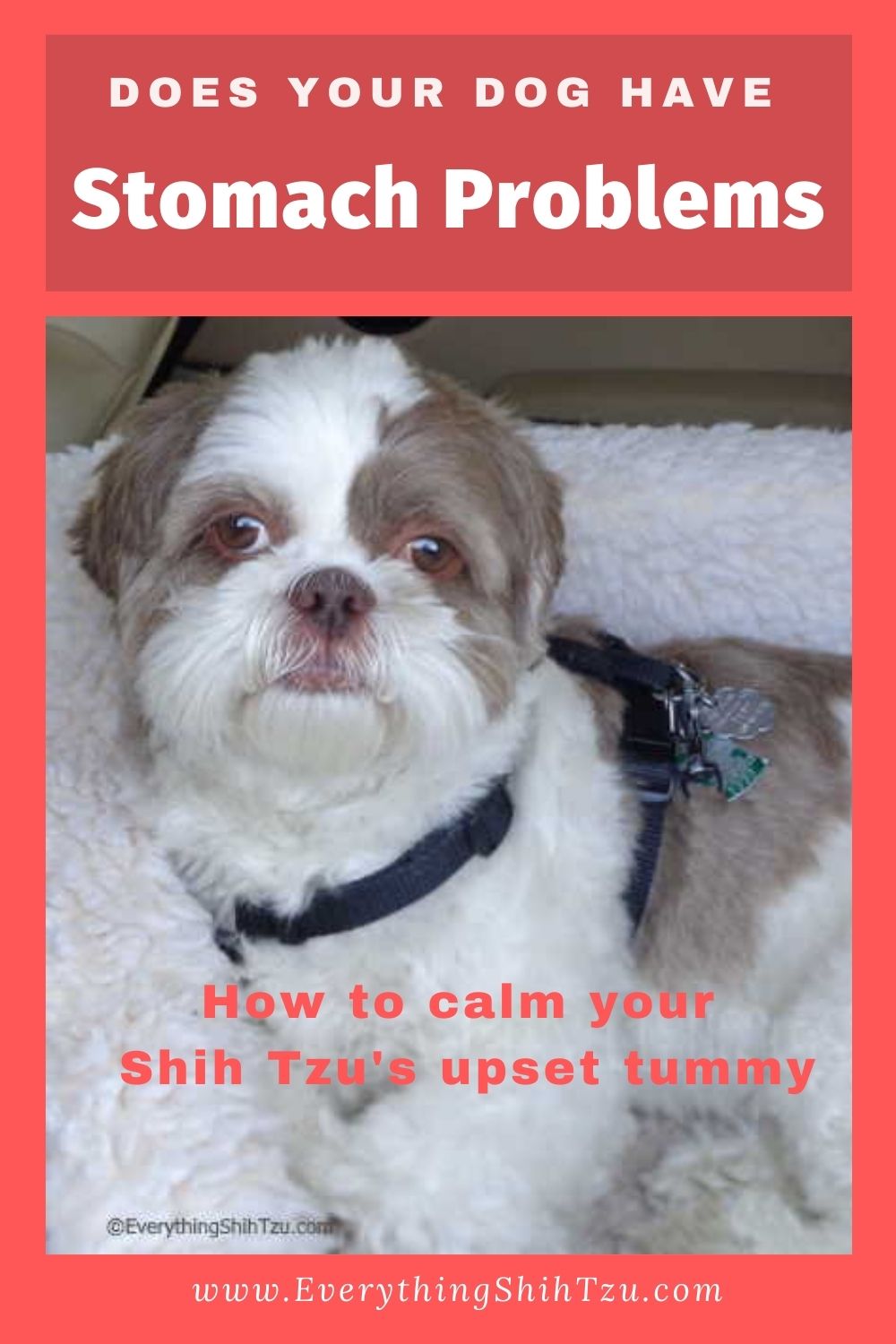Do Shih Tzu Get Stomach Problems?
BY MOLLY | EVERYTHINGSHIHTZU.COM
Stomach issues can befall any dog breed and Shih Tzu are no exception; however, Shih Tzu are not overly susceptible to stomach problems as are some other types of dogs.
In fact, Shih Tzu, although there are several health conditions that they are prone to, tend to be pretty sturdy pups.

When it comes to the digestive system, even if there aren’t issues that are inherent in the breed, your canine companion can still experience an upset stomach and other factors, so it’s worth knowing the possibilities.
Shih Tzu are not known for having stomach problems, but that doesn’t mean they can’t get an upset tummy or experience intestinal discomfort.
Your dog might eat something that doesn’t agree with her or perhaps she has an allergy to a certain food that causes intestinal issues.
Your Shih Tzu can also pick up a virus, or maybe she’s a fast eater, which can also have unpleasant digestive results.
Your best line of defense against potential stomach problems is to know about different conditions that can affect your pup’s tummy and what you should do about them.
Of course, this means knowing your pup and watching her for any signs of unusual behavior that can clue you into something amiss.
First things first, what are some things that can tip you off to Shih Tzu stomach problems?
Signs of Stomach Problems in Shih Tzu
If you notice something just isn't quite right about your pup, for example, she’s acting strangely, or she seems more tired than usual, then the odds are good that something is bothering her.
If you notice your dog doing any of the following, then stomach issues might be to blame for her uncharacteristic behavior:
- Your pup has diarrhea
- Your pup is vomiting
- Your pup has the dry heaves
- Your pup’s stomach is making loud, gurgling noises
- Your pup is drooling excessively
- Your pup has gas or is bloated
What Are Some Common Stomach Issues in Dogs?
Your Shih Tzu can get stomach problems for a number of reasons and not all of them are due to a serious medical condition or underlying health problem.
For example, your pup might just have a simple stomach bug that will resolve in a day or two, or she may eat something that upsets her stomach. However, there are several causes for stomach issues that are more cause for concern and, in many cases, the sooner you address the problem, the easier you can handle it.
Here’s a look at some of the more common dog stomach issues:
Your pup ate something she shouldn’t have or didn't agree with her
You know the feeling, you eat a meal, and then suddenly, you just don’t feel right. Sometimes, your pup experiences the same thing; she eats a piece of grass, or a piece of trash (dogs aren’t known for their sophisticated palates) and it makes her throw up or get a little woozy.
The major thing to pay attention to here is, what did your pup eat?
You need to make sure that the offending item isn’t poisonous for your pooch.
You switched to a new dog food
When you switch dog foods on your pup, you need to do it gradually so you can ease her stomach into the process.
Start by adding a little bit of the new food into her usual daily food. Next, slowly increase the amount of new food as you decrease the amount of old food over several days.
Your dog has a food allergy or intolerance
Sometimes, your dog might have a food allergy or intolerance that causes her to get an upset stomach when she eats certain things.
Your vet can help you determine if this might be the case and help you narrow down which foods your pooch may have an issue with, and then you can adjust your pup’s diet accordingly.
Your dog ate too fast
Sometimes your pup might eat faster than her stomach can handle. If your dog is a fast eater, consider getting a slow-feed bowl to help her eat at a safer speed.
Your pup has a stomach virus
Your dog can get a tummy bug just like you. If you suspect that this is the case, treat your pup with some at-home remedies (discussed below), but watch her closely for any signs that things are not improving. If her situation gets worse, call your vet
what should you do when your shih tzu has an upset stomach?
If you think your pup has an upset tummy because of something she ate or a little bug, let her fast for several hours and then feed her a small amount of food (keep to a bland diet) for a couple of days.
Make sure the food that you give to your pup is not seasoned or spicy.
Some good options for what to feed your pup if she has upset stomach are:
- Plain, white rice
- Mashed sweet potatoes
- Skinless chicken breast
- Plain Greek yogurt
- Canned pumpkin (not the pie filling)
If your pup is having diarrhea or vomiting, then it is also important to make sure you are replenishing her fluids and electrolytes.
Offer her a 50/50 mix of cool water and unflavored Pedialyte, in small amounts at first, then as your pooch improves you can stick to plain water.
Keep an eye on your Shih Tzu to make sure her symptoms don’t worsen; if things don’t improve, bring her to your vet as soon as possible.
If you notice your pup is having some more serious complications, or you are unsure of why she is having problems, call your vet immediately as there could be an underlying issue at play, like a stomach ulcer or other medical situation.
Take your pooch to the doctor pronto if your dog exhibits any of the following:
- Extreme agitation or restlessness
- Can’t even hold down water for more than 5 hours
- Bloated stomach
- Fever
- Blood in vomit or stool
- Throwing up for more than 8 hours
- Diarrhea for more than one day
- Dry Gums
- Lethargic behavior or collapse
Also, if your pup has diarrhea and vomiting at the same time, you need to act fast; at this point, a trip to the vet might be the only way to avoid dangerous dehydration.
Basically, your Shih Tzu can get stomach problems like any other breed, but she isn’t more susceptible to them.
If you think your pup may have an upset stomach, watch her closely and think about her recent actions. If it is something she ate or a stomach bug, you can treat the problem at home with simple remedies and watch for signs of improvement.
If your dog still seems to be having trouble after a day or two days, or she gets worse, call your vet immediately.




